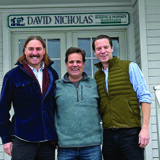CAPE MAY — City Council discussed limiting the extension of premises applications for liquor licenses June 3.
“There’s been some informal internal discussion about relatively recent applications we’ve seen,” solicitor Chris Gillin-Schwartz said, adding that post-pandemic, City Council saw a string of liquor license transfers, likely because of the real estate sales at the time.
One such discussion included two instances of expanding premises and essentially taking one license and applying it to another property, Gillin-Schwartz said.
“It was the effect of expanding that single license and creating a pocket license in the context of the sale,” he said. “The council is considering whether the city wants to see that type of thing in the future.”
Gillin-Schwartz explained that a pocket license allows expansion into another licensed premises; effectively, the person selling it is pocketing a license. He also added that the city was considering the expansion of liquor licenses not as a zoning concern but as the licensing authority for the city.
“I will tell you that I don’t think you necessarily need to do that unless you have a clear rule in mind as to how you want to approach that, because you still retain the ability to review every one of these applications,” he added. “Just like we did before the numerous ones came in and you review them on a case by case basis.”
Gillin-Schwartz said a common denominator the city had seen was instances in which businesses were expanding into premises that were already licensed.
“You have to take into account the effect on the surrounding properties,” he said. “The placement of these liquor licenses is equally unique, and the concerns are unique to each particular property.”
Deputy Mayor Maureen McDade asked about the definition of continuous and adjoining property line shares. Gillin-Schwartz said he did not want to get into every hypothetical scenario, which is why the council can take each particular application into consideration.
“You have to take into consideration the relationship between whatever property is being proposed in every application,” he said. “We can do an ordinance if you want to prohibit a certain placement, but if you don’t do that, it doesn’t mean that anything goes.”
Mayor Zack Mullock asked if, in a potential ordinance, council would be limiting expansion into a non-liquor license-holding establishment and if that could be appealed to the Zoning Board as a variance.
“That’s the other thing you have to keep in mind with this is that independent of the liquor license issues, there’s always a zoning issue,” Gillin-Schwartz said. “In every one of those applications that we saw, there was a zoning review that the city clerk and I went through the zoning office to flush out any initial zoning issues before it got to the council table.”
Mullock said he was concerned that a business owner purchases a property adjacent to or behind a property with a liquor license may believe he or she would have the opportunity to transfer or absorb the license.
“This is all hypothetical, but I’d much rather have the rules laid out so that they don’t spend a $1 million thinking this is going to be an easy liquor license expansion and city council just denied us,” Mullock said. “I’d rather have this very clear than have to deny someone as an applicant.”
Gillin-Schwartz said liquor license transfer is subject to approval, and there is no automatic approval anywhere in the state.
“All this provision might do is give a preview that this is a bridge too far for the city of Cape May,” he said. “Maybe we don’t want to expand into places that weren’t previously licensed.”
Councilman Shaine Meier asked if the police department reviews it as well. Gillin-Schwartz said the police department conducts background checks on person-to-person transfers.
“The police get more involved in the operational standpoint of conditions that we might want to set on a property or facility,” City Manager Paul Dietrich said.
Mullock asked the council to review the draft ordinance regarding liquor licenses and reach out to him with their thoughts.
“I just want to be clear — if you don’t adopt an ordinance, we’re just going to continue to review on a case-to-case basis,” Gillin-Schwartz said. “If you do an ordinance, it may put everybody on notice that these are the type of things that’s going to provide clear direction for applicants.”
Other business
Dietrich said that at the end of the first month of mercantile license renewals being due, the city has issued just fewer than 1,200 permits. There are still 230 delinquents from last year that have not been renewed. He added that some of the licenses are in a holding pattern because the applicants have not submitted documentation or have outstanding bills.
“We’re handing it over to code enforcement to start tracking them down,” Dietrich said. “The office has sent out numerous emails and physical mail to all of these businesses that are fully aware of their requirements.”
Beach tag sales have been sluggish compared to last year, Dietrich added.
“We’ve had a rainy spring that continued through most of May, so that helped contribute to some of our tag sales,” Dietrich said.
Metered parking
City Council passed an ordinance incorporating the Cape Island Baptist Church parking lot into the city’s Park Mobile program. The metered parking has a three-hour limit from April 1 to Oct. 1. No overnight parking is permitted at any time.
A resident asked the council if the city would enforce overnight parking regulations and if there would be a sign prohibiting it. He said his primary concern is that people could park and sleep in the lot overnight.
“We’re not providing that as a public place to stay and park your car overnight,” Gillin-Schwartz said. “However, there’s also a provision in there for parking passes for the church, because the church is still going to be having use of that lot.”
By RACHEL SHUBIN/Special to the Star and Wave

